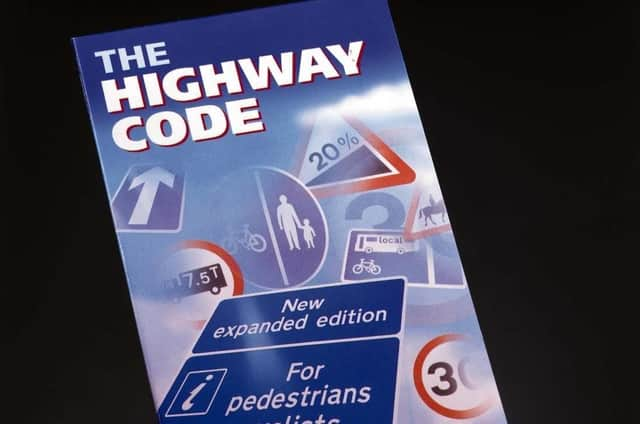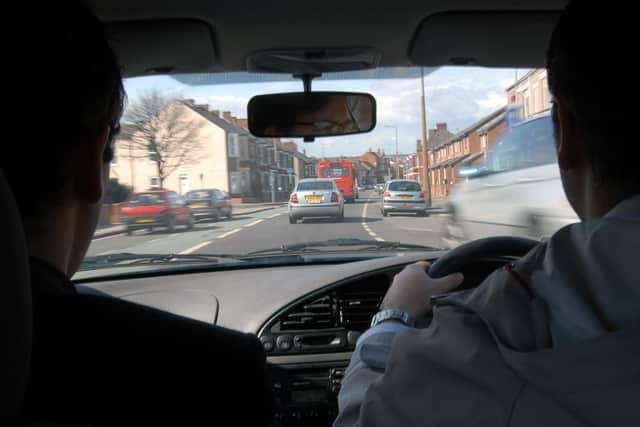Highway Code signals a wrong turning for police – David Behrens


What it does do is lay down the law on giving way to cyclists and pedestrians. You’re now supposed to stop for people waiting to cross the road even if they’re not at a zebra crossing. At the same time, new rules and stricter penalties are being brought in to curb the use of mobile phones by drivers.
The assumption by the Department for Transport appears to be that the police are adequately equipped to enforce all this, but the evidence suggests that they can barely cope with the workload they have already.
Advertisement
Hide AdAdvertisement
Hide AdAccording to statistics published last week, nine out of 10 burglaries in Yorkshire now go unsolved, and none of the region’s four police forces has a higher conviction rate than eight per cent.


It means that if the new highway regulations are to be enforced, a housebreaker is more likely to be arrested for not giving way to a cyclist as he makes his escape than for having it away with your family silver.
The problem for the police is one of priorities. Solving burglaries is resource intensive because the perpetrators have an annoying habit of always running away. Victims, on the other hand, are sitting ducks.
Advertisement
Hide AdAdvertisement
Hide AdThis might be funny if it weren’t so distressing for those involved. Take the case of Robert Hooper, a farmer in the high Pennines who was cleared by a jury this week after he defended his property by flipping a car off his land with the sharp end of a tractor.
A man of hitherto blameless character, he had been through months of hell, he said, as he waited for justice to run its course. He hadn’t been looking for trouble, but the car was blocking his access during a busy day on the farm, and when he politely asked the driver to move it, a 21-year-old, shirtless and drunk passenger punched him in the face. In an area notorious for visiting youths taking drugs, dropping litter and knocking down dry stone walls, this was the straw that broke the camel’s back. Outside court, neighbouring farmers cheered the verdicts, for they, too, could see that the scales of justice had been at risk of tipping against the principle of the lone Englishman defending his castle.
But those burglary statistics demonstrate that no-one else is going to defend it for you. In the last seven years, the proportion of solved break-ins has almost halved across England and Wales– either because no suspect had been identified, there was not sufficient evidence, or a prosecution was deemed “not be in the public interest”.
South Yorkshire had the third-highest “no resolution” rate in the country, and in the North Riding, just 4.4 per cent of cases were listed as resolved. Even worse, anyone who dialled 999 to report a crime to North Yorkshire Police would likely have had to hold the line for two minutes or more before anyone answered, according to another report this week. Not even directory enquiries took that long.
Advertisement
Hide AdAdvertisement
Hide AdThe appointment of police and crime commissioners exactly 10 years ago was supposed to do away with shortcomings like those by making the police more accountable to the public and prioritising those areas of law enforcement that make the rest of us feel more secure. I don’t think anyone would seriously argue that burglary does not belong in that category.
Yet this Monday, North Yorkshire’s chief constable, Lisa Winward – whose force already has one of the country’s highest council tax demands – was arguing for the maximum allowable annual increase, in order, as she put it, to “get on the front foot”. There had been “a conveyor belt” of issues caused by a minority of residents, she said. Forgive me, but hasn’t that always been precisely the nature of crime?
It’s not more money that will improve the statistics, though it won’t go amiss, but a clearer commitment to pursuing villains, not victims – and in particular on locking up those who commit crimes against people and property. Until that happens, the best advice for those of us who want as little contact with the police as little as possible is to flog the car and take up burglary.
Advertisement
Hide AdAdvertisement
Hide AdSupport The Yorkshire Post and become a subscriber today. Your subscription will help us to continue to bring quality news to the people of Yorkshire. In return, you’ll see fewer ads on site, get free access to our app and receive exclusive members-only offers. Click here to subscribe.
Comment Guidelines
National World encourages reader discussion on our stories. User feedback, insights and back-and-forth exchanges add a rich layer of context to reporting. Please review our Community Guidelines before commenting.